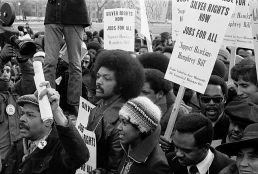The US spends around $48 billion on the war on drugs each year. The massive spending doesn’t do much to stop drug use, but it has been a major boon for arms and security contractors and human rights abusers around the world.
By Mattha Busby, Jacobin
Excerpted and adapted from Should All Drugs Be Legalized?: A Primer for the 21st Century (Thames & Hudson, May 2022)
When the former Bolivian president Evo Morales implemented the legalization of coca leaf growing in 2004, he knew he was taking a risk. The man who made his name as leader of a militant coca growers’ union then expelled the US Drug Enforcement Administration (DEA) officers who had backed a violent coca eradication campaign that often left farmers without viable alternatives. In terms of limiting coca production and reducing violence, legalization worked.

Morales — later forced to flee Bolivia following a US-supported coup — had argued that the increased demand for cocaine in North America should not rob indigenous people of ancient traditions going back potentially eight thousand years, as well as coca’s benefits. He called on the UN to remove it from its list of prohibited drugs.
“This leaf represents . . . the hope of our people,” Morales told the General Assembly in 2007, holding a coca leaf aloft. He negotiated successful crop substitution plans in an attempt to limit Bolivia to twenty thousand hectares of coca-growing fields — leading to a 12 percent decrease in the area used to grow it by 2011 (before limits were increased in recent years to service demand).
The US state department said Bolivia, which was implementing socialist reforms under its first-ever indigenous president, had “failed demonstrably to adhere to its obligations under international counternarcotic agreements.” The United States withheld approval for Bolivia’s antidrug policies (dictating whether they received aid or trade benefits from the country), even though it certified allies Colombia and Peru, which both saw coca cultivation rise. Eventually, Bolivia unilaterally withdrew from the 1961 Single Convention on Narcotic Drugs, amid objections from Western states, before re-acceding in 2013 with an allowance for the chewing of the coca leaf.
Morales tweeted in 2021 of US authorities: “The so-called ‘war on drugs’ is an excuse to attack progressive and anti-imperialist governments. It is a cover for your geopolitical interests.” His measures brought peace to coca-growing areas that had been riddled with narco killings, police violence (including rape threats), and farmer protests, which were forcibly put down — while the US demanded an end to coca production and handsomely funded such efforts.
A 1995 Human Rights Watch report said US aid to Bolivia “supported programs and policies deeply flawed by human rights abuses, including prolonged detention of suspects even after their acquittal, due process violations by antinarcotics police, alleged torture, and impunity for law enforcement personnel accused of violations among both the Bolivian and US forces.”
Recent Posts
‘The Siege Must Be Broken’: Countries Called to Ship Fuel to Cuba After Trump Tariffs Struck Down
February 21, 2026
Take Action Now The US Supreme Court’s ruling “implies that Trump’s recent order imposing tariffs on countries selling oil to Cuba exceeds the…
Elite Depravity in Imperial Decline, A Zero Hour Conversation With Richard Wolff
February 20, 2026
Take Action Now “The system self-selects for psychopathy… the most sociopathically obsessive competitor and accumulator of personal power and…
Economics of Health For All: The Plan to Put Health at the Heart of the Global Economy
February 20, 2026
Take Action Now At the World Health Assembly in May, member states may endorse an unprecedented strategy declaring that health is not a cost – but…
The Left Owes a Lot to Jesse Jackson
February 19, 2026
Take Action Now As a movement builder, spokesperson, and candidate for the presidency, Jesse Jackson’s accomplishments were massive. He was one of…




